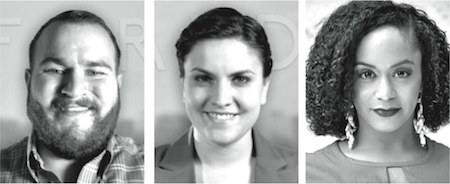May 29, 2015

The film’s producers Jonathon Leslie-Quam and Jamie Quam, and the film’s content producer, Sheba McCants.
“It wasn’t just about the statistics. We wanted to show the human side of what was going on in our community and that Madison is not what we think it is,” said filmmaker Jamie Quam.
Over a year and a half ago, Jamie Quam and Jonathon Leslie-Quam were sitting down for the lunch conversation that would spark the idea behind their documentary, Forward: Anger Into Action, which follows the people and organizations fighting for racial justice in Madison.
Their conversation came on the heels of the October 2013 release of the “Race to Equity” report, which found significant racial disparity in Madison and Dane County despite the city’s image of being politically progressive and a great place to live, work and raise a family.
“The film will serve as an opportunity to encourage conversation and expand into areas that haven’t yet been reached,” said McCants, one of the film’s content producers.
Researchers working on the report discovered Black unemployment rates, juvenile and adult arrest rates and poverty rates not only far higher than those of whites, but far higher than the national averages in those areas.
In addition, Blacks in Dane county were found to have significantly lower reading proficiency levels and were far less likely to take college entrance exams.
At the time of the report’s release, Rev. Gee, author of the “Justified Anger” essay, Jerome Dillard, founder of Voices Beyond Bars and coordinator of the Dane County Jail Reentry program, the WYCA, and many other local leaders and organizations, were fighting back and the Quam brother-sister duo were set on getting involved.
“It wasn’t just about the statistics. We wanted to show the human side of what was going on in our community and that Madison is not what we think it is,” said Jamie Quam, who works with Domestic Abuse Intervention Services.
Her brother, a professor of documentary filmmaking at Midwestern State University, said that while living in the Madison area, he did not realize how bad Madison’s racial disparities really were.
“I had never really recognized the level of disparity in Madison while I lived there and, ultimately, that made me a part of the problem,” he said.
Urged on by their own failure to recognize the problem of race relations in Madison and the significant societal implications behind the report’s findings, the Quams put into action their idea for a social justice film set on making a difference.

They slowly began to gather a crew, which would eventually include Joe Brown, producer and director of photography, a cameraman whose work has been featured at numerous film festivals, and Sheba McCants, a graduate of New York University who finds particular interest in using the arts to create social justice and community change.
McCants serves as content producer on the project. Their goal was to showcase the people behind the social justice movements in Madison.
“Artistically, there is so much collaboration on the project. Tons of local people who have a stake in what we’re talking about. Madison is the type of community where you’ll see people in the film you’re familiar with and that you know. The film will serve as an opportunity to encourage conversation and expand into areas that haven’t yet been reached,” said McCants.
“There is no documentary like this right now. We really want this film to look like a roadmap towards change. A way for individuals to place themselves in groups and find social equality work that they can get involved with,” said Leslie-Quam.
For those looking to get involved with the project, the film’s production crew recommends both spreading the word and donating to help finance the team and local filmmaking community through their IndieGoGo campaign. Camera operators, local designers, photographers, and others interested in becoming a part of the film’s artistic team, are invited to contact the Quams for more information.
Most importantly, however, is the need for feedback from community members on people and organizations not yet recognized or featured by the film.
“Everything goes back to the individuals and the work that’s being done and the people that are being featured,” said Jamie Quam. “A documentary is a living entity. Where we’re at right now is not where we’re going to be in 2 years. When somebody watches this documentary, I want them to take an honest look at who Madison was and what it can become. There is amazing work being done. All the people featured are examples of the adversity, frustration, pain and hope that resides in every individual who is working to create change.”
Filming since January of 2014, the documentary is heading into its third and final year of production. The Quams hope to debut the film at free community screenings around Madison by the summer of 2017.

